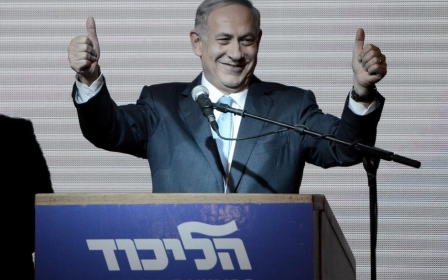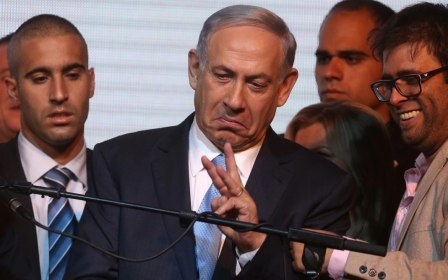EU plans to pressurise Israel into recognising Palestinian rights

The European Union may pressurise Israel into recognising the right of Palestine to exist following Prime Minister Benjamin Netanyahu’s election campaign against a Palestinian state being created under his rule, Israeli newspapers reported on Wednesday.
An EU diplomatic source said that the European Union would potentially implement decisions in a report which outlines suggestions on how to pressure Israel into returning to negotiations, reported the Israeli daily Ynet.
The report – a list of 40 recommendations suggested by the heads of diplomatic missions in Jerusalem and Ramallah - is divided into four sections that recommend several steps which include preserving the viability of Jerusalem as the capital of two states, strengthening the religious and cultural identity of Jerusalem, ending East Jerusalem’s socioeconomic isolation, and strengthening the role of the EU.
Although member states have yet to approve the recommendations, there is a definite chance that recommendations will be adopted after Netanyahu’s statements during his election campaign against a Palestinian state, the source said.
"We are on a collision course," said the diplomat. "It's clear to everyone in Brussels that there must be a response to these statements,” reported Ynet.
The diplomat added that the EU does not believe Netanyahu's subsequent backtracking on the creation of a Palestinian state. He said Europe is interested in having a positive relationship with Israel, but considers Israel to be an entity that does not extend beyond the Green Line – the boundaries of Israel from its founding in 1948 until the 1967 Six-Day War, reported Ynet.
"If Israel continues its policy beyond the Green Line, it will affect the relationship between European nations and Israel," he told Ynet.
After the victory of Netanyahu in the elections, analysts have pointed towards the likelihood of a right-wing government being formed in Israel. The EU diplomat highlighted that this could consequently mean the recommendations would be taken especially seriously by the EU, reported Ynet.
The year of 2014, has been one of the tensest years in Jerusalem since the end of the Second Intifada. The kidnapping and murder of Mohammed Abu Khdeir in July 2014 after the burial of three murdered Israeli teens in East Jeruslaem triggered a 51-day offensive on Gaza, while an assassination attempt on the life of a Jewish activist caused continuous clashes in and around the city.
EU hopes for Israeli-Palestinian negotiations resumption
The EU is keen to bring Israelis and Palestinians back to the negotiating table after the bloc's new foreign policy chief seeking to reinvigorate European involvement in the negotiations.
Israel should make "every effort to ensure an early resumption of the Middle East peace process," the EU said in a series of annual reports assessing progress on democracy and human rights in countries close to the 28-nation bloc.
EU foreign affairs Chief Federica Mogherini, who took on her position in November, wants to involve Arab states more closely in the work of the Middle East Quartet that comprises the United States, United Nations, the EU and Russia.
New MEE newsletter: Jerusalem Dispatch
Sign up to get the latest insights and analysis on Israel-Palestine, alongside Turkey Unpacked and other MEE newsletters
Middle East Eye delivers independent and unrivalled coverage and analysis of the Middle East, North Africa and beyond. To learn more about republishing this content and the associated fees, please fill out this form. More about MEE can be found here.




